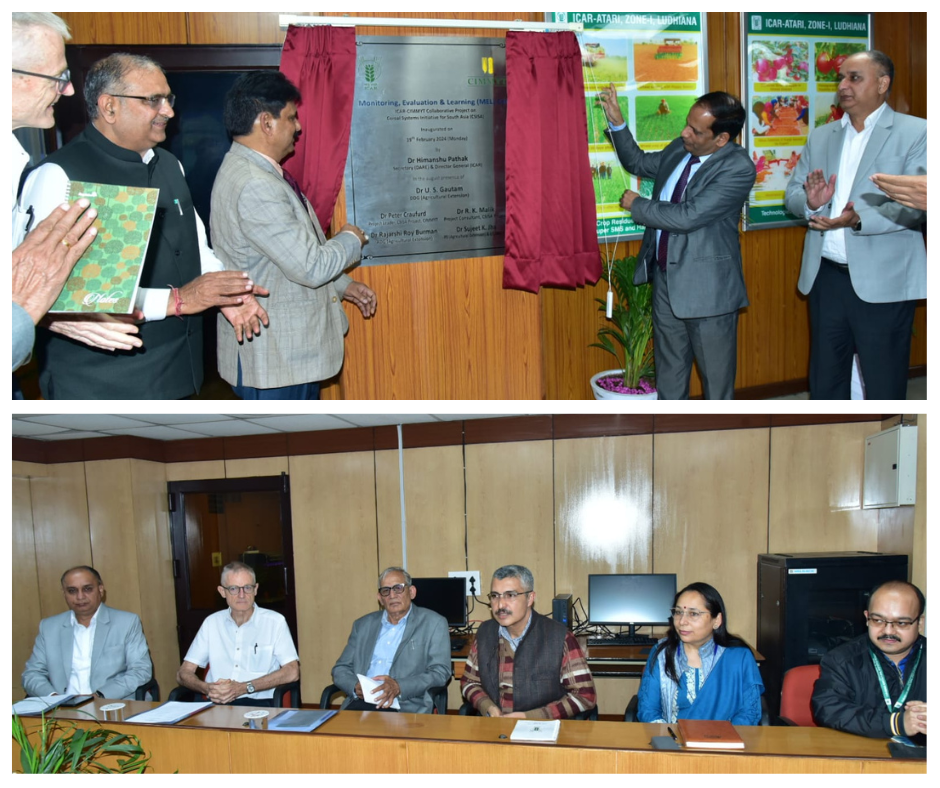MEL Cell established at the Division of Agricultural Extension, Indian Council of Agricultural Research
The Cereal Systems Initiative for South Asia (CSISA) project in India works closely with the Indian Council of Agricultural Research (ICAR) Division of Extension, Krishi Vigyan Kendras (KVK), State Agricultural Universities (SAUs) and state governments to strengthen the research for development (R4D) system by integrating convergence processes with evidence generation and feedback from large-scale surveys with farmers.

In 2018-2019, CSISA embarked on an ambitious task of generating data for evidence: Landscape Diagnostic Survey (LDS). They were supported in this task by select Krishi Vigyan Kendra (KVKs) centers in the states being covered under LDS. The LDS process generated over 7000 data points for rice and wheat cultivation practices from eight states across India. Based on the survey database, two publications, ‘New Frontiers in Agriculture Extension’ – on wheat and rice – were published documenting the data collection and its processing methods, learnings and priority setting, and evidence-based district-level adoption patterns of technologies to identify future actions and as a proof of concept.
Taking inspiration from CSISA’s large-scale LDS survey for evidence generation and big data management, the Division of Agricultural Extension recently established a Monitoring, Evaluation and Learning (MEL) cell at its offices in ICAR in Delhi, the apex body of India’s National Agricultural Research Systems (NARS). In his opening remarks, Dr U.S. Gautam, Deputy Director General (Agri. Extension), highlighted the extensive work of the CSISA-KVK network in developing agronomic management for supporting cropping systems in the region.
“As part of our focus on ‘Extension Research’, we have introduced a process change by creating a MEL cell in the division of Agricultural Extension to understand the adoption patterns of agricultural technologies, yield gaps and resource use patterns as a feedback loop for setting priorities for research and extension in different farming systems,” he said.
While explaining the importance of data-driven decision-making in research and extension systems, Director General ICAR and Secretary, Department of Agriculture Research and Education, Dr Himanshu Pathak, who inaugurated the cell on 19 February, said the MEL Cell is a significant step toward the process change.
“The MEL cell will help synthesize the data and integrate it with emerging technologies like AI and machine learning, helping present a broader picture for policymakers to take informed actions,” he said.
Highlighting the need beyond data generation and integrating them into systems for evidence gathering, Dr Peter Craufurd, CSISA lead for India, said that CSISA is steadfast in its commitment toward skill transfer under the partnership.
“CSISA’s role starts with capacity building while working closely with national agricultural systems at the centre and state on research priorities. LDS integration with MEL analytics can be the driver of change to integrate data, evidence and prioritization ecosystem”, said Dr Craufurd
According to Dr Virender Kumar, South Asia lead for CGIAR’s Excellence in Agronomy (EiA), MEL will help identify current and emerging challenges and generate new insights and learnings from big data analytics.
“In eastern Indian states (Bihar, EUP, Jharkhand, Odisha, Assam, and potentially WB), the current focus areas for system intensification by ICAR, we can showcase and demonstrate the mature technologies at scale and help in improving productivity and profitability of farmers”, he said.
The MEL Cell will integrate thousands and thousands of data points, support evidence, and provide insights for decision-making and policy coherence in agriculture extension research and practice. ICAR aims to establish similar cells across Agricultural Technology Application Research Institutes (ATARIs) in the country to streamline data and evidence generation for policy implementation.
Dr AK. Singh, Vice-Chancellor RBL, Jhansi, said, “Initiating a model with crucial capacity support from CSISA for a central MEL Cell at ICAR with the Division of Agricultural Extension came with the understanding that a process needs to be in place to streamline data and evidence generation for policy coherence and informed decision making”. According to him, MEL Cell is a step toward policy coherence between different arms of agriculture research and development.
